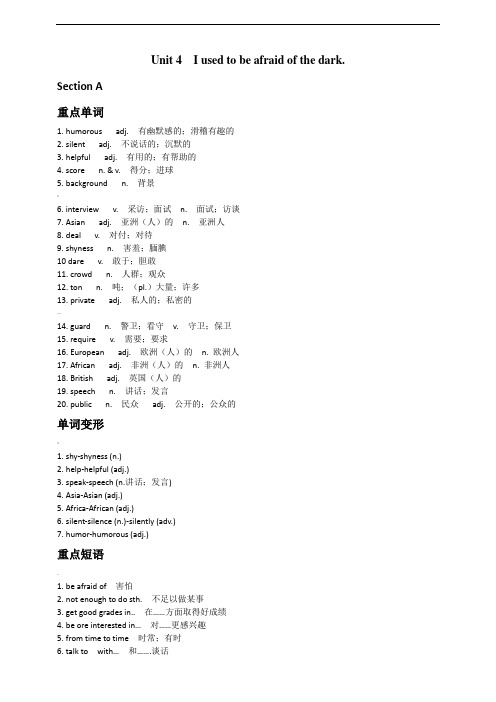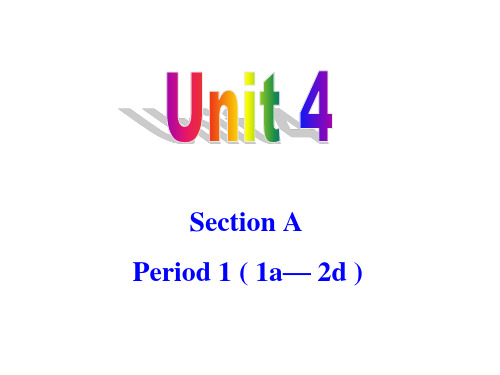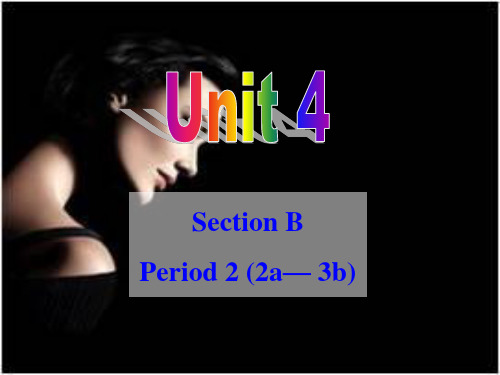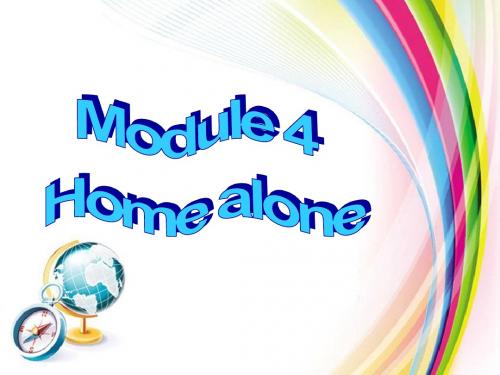2014-2015学年九年级英语(上)UNIT 4 教材听力原文及汉语翻译
九年级英语全一册(上)Unit-4--I-used-to-be-afraid-of-the-dark

Unit 4 I used to be afraid of the dark. Section A重点单词1. humorous adj. 有幽默感的;滑稽有趣的2. silent adj. 不说话的;沉默的3. helpful adj. 有用的;有帮助的4. score n. & v. 得分;进球5. background n. 背景~6. interview v. 采访;面试n. 面试;访谈7. Asian adj. 亚洲(人)的n. 亚洲人8. deal v. 对付;对待9. shyness n. 害羞;腼腆10 dare v. 敢于;胆敢11. crowd n. 人群;观众12. ton n. 吨;(pl.)大量;许多13. private adj. 私人的;私密的—14. guard n. 警卫;看守v. 守卫;保卫15. require v. 需要;要求16. European adj. 欧洲(人)的n. 欧洲人17. African adj. 非洲(人)的n. 非洲人18. British adj. 英国(人)的19. speech n. 讲话;发言20. public n. 民众adj. 公开的;公众的单词变形~1. shy-shyness (n.)2. help-helpful (adj.)3. speak-speech (n.讲话;发言)4. Asia-Asian (adj.)5. Africa-African (adj.)6. silent-silence (n.)-silently (adv.)7. humor-humorous (adj.)重点短语。
1. be afraid of 害怕2. not enough to do sth. 不足以做某事3. get good grades in.. 在……方面取得好成绩4. be ore interested in…对……更感兴趣5. from time to time 时常;有时6. talk to with…和…….谈话7. see sb. doing sth. 看见某人在做某事8. take up doing sth. 开始做某事…9. deal with / do ith 应对;处理10. dare(not)to do sth. (不)敢做某事11. not… anymore 不再……12. all the time 一直;总是13. worry about…担心……14. be very careful about…非常注意……15. be prepared to do sth. 准备好做某事16. give up (doing)…放弃(做)……/17. fight on 继续战斗18. requite a lot of talent 需要很多天赋19. make it to the top 能成功到达顶峰20. a very small number of 一小部分21. eat a lot of vegetables 吃大量的蔬菜22. listen to pop music 听流行音乐23. watch scary movies 看恐怖片24. in public 公开地;在别人(尤指人生)面前…25. at least 至少重点句型1.他过去个子真矮。
2014九年级英语unit4_I_used_to_be_afraid_of_the_dark.(全单元)

Past
Doggy
Now
He ___________ used to play football, now he _____basketball. plays He used to play basketball, didn’t he? No, he didn’t.
Listen !Bob is seeing
Ⅰ. 单项选择 1. ---How do you often go to school? B walk but I take a bus now. ---I _______ A. am used to B. used to C. use to D. am used 2. She used to _______ few friends, but now D she has many friends. A. be B. having C. has D. have 3.He used to _______ in the sun, but now he is C used to _______ at night. A. read; read B. reading; read C. read; reading D. reading; reading
tall
short
3. Tina used to have_____ red and ______ curly hair.
I used to be afraid of the dark. 我过去怕黑。 “used to do sth.”过去常常做某事 但现在已经不再存在了。
be/get
used to doing sth. “习惯于….”强调现在的情况
2d Role –play the conversation.
2014秋九年级unit4 SectionA课文知识点讲解SectionA

【用法归纳】 【辨析】:used to do sth, be used to do sth. be used to doing sth. used to “过去常常”(后接动词不定式, 表示过去的习惯)。 否定式有两种: did not use to或used not to。 疑问式有两种: e to...?或Used...to do...? 但常用第一种。答语形式与did和 used的形式一致。
【湖北岳阳】I knew it was impossible for me to go to work on time (按时上班) when I missed __________ the last bus. 【山东东营】Tom didn’t go to school _____ this morning because he overslept. A. at once B. on time C. by accident D. at present 【2011云南中考】85. As students, we should study hard, at _______ it ’s important the same time for us to get on well with others. (同时) 【2013湖北黄石4】The teacher hope all of us can hand ____ our homework ____time every day. A. up ; in B. out; on C. on; in D. in ; on
4.friendly adj.友好的
【解析】be friendly to=be good to=be kind to“对什么友好” friend →friendship n 友谊 make friends (with)与某人交朋友 friendly → (比)friendlier →friendliest
2014年秋-人教版九年级英语-unit4-全单元课件

Appearance tall
straight hair beautiful black dirty hungry sad tired
Personality outgoing funny angry careful happy hard-working strange
noisy
Do you like them? Can you describe them what they used to look like?
She wasn’t very
_o_u_t_g_o_i_n_g_. She was
never brave enough to
almost every day. She’s also on a
____sw__im____ team.
ask questions. 2. She got good grades
in _sc_ie_n_c.eShe was also
good in _m__u_si_c. She
2. She still plays the
__p_i_a_n_o__ from time to
time.
used to play the
_p_i_a_n_o_.
Make conversations about yourself or other people.
shy. 4. You should be h_a_r_d_-_w__o_rk__in_g_ to achieve
success.
1b Listen. Bob is seeing some s for the first time in four years. What did his friends use to look like?
2015九年级英语上Unit 4 Section B-2(人教版含mp3录音)精选教学PPT

Translate the phrases.
a 15-year-old boy do well in school cause problems look for jobs take care of feel lonely and
一个 15 岁男孩 学业好; 在学校表现好 制造麻烦 找工作 照顾 / 照料… 感到孤独和不开心
to …
I like reading comics.
music
sports
food
favorite subject at school
favorite things
Enjoy a song, You Raise Me Up by Westlife. Dedicate (献) this song to our parents.
2f What do you think Li Wen and his parents talked about in their conversation? Write a conversation and role-play it with your group. Think of the following things:
➢Possible questions Li Wen might ask his parents
➢Questions his parents might ask Li Wen ➢Possible answers from Li Wen and his parents
When you have different opinions with your parents, how do you deal with that?
in person
亲身; 亲自
2014-2015九年级英语上册外研版Module4 unit 2 1

Write a passage about what you can do and what you cannot do when your parents are away.
●
Make lists of what you can do and cannot do and cannot do when your parents are away. I can wake up on time. I cannot make breakfast.
Now join the sentences with although, but or so…that. I can wake up on time, although I cannot make breakfast. ● Write a conclusion to the sentences. I will miss my parents, but I think I can look after myself very well. ● Share your passage with your classmates.
sofa n. (长) 沙发
snack n. 点心; 小吃
midnight n. 午夜; 子夜
burn (burned, burned; burnt burnt) v. (使)烧焦; (使)烤糊
empty adj. 空的
cup n. 杯子; 一杯饮料
Work in pairs. Talk about daily things you do alone and the things your parents do for you.
a) Zheng Chenyu found his life more difficult without his parents. b) Zheng Chenyu depended on his parents to prepare meals for him. c) Zheng Chenyu had so much homework that he did not have time to look after himself. d) Zheng Chenyu should learn to cook.
译林版九年级上册英语Unit4课文翻译译林版九年级上册英语
译林版九年级上册英语Unit4课文翻译译林版九年级上册英语当我们阅读并遇见生词时,我们有时能通过它们的构成形式猜测词义。
有时候一个后缀改变了一个单词的部分发音,但是词叉几乎仍然保持不变。
因此,如果你知道词根的意思,你就能猜出这个词的意思,例如,疾病、成就、有活力的、危险的。
有时候一个前缀或后缀改变了一个词的意思,例如,不正确的、不喜欢、不幸的、无家可归的。
有时候两个单词舍在一起构成一个合成词,例如,黑板。
一些合成词有一个连词符“一”,例如,努力工作的。
MilliehafoundoutmoreaboutAnneFrankandherbook.Sheunderlinedom enewwordinaparagraph.Helpherguetheirmeaning.Matchthewordonthelef twiththemeaningontheright.Writethecorrectletterintheblank.米莉找到了更多关于安妮·弗兰克和她的书的内容。
她在一个段落中的一些生词上画了线。
帮助她猜测词义。
把左边的单词和右边的词义进行匹配。
在空白处写出正确的字母。
当《安妮日记》一被出版,它就成了一本畅销书。
很快全世界的人都读了这本书。
这不是一个虚构的故事,而是在战争时期一个青少年的真实经历。
在这本书里,安妮,一个犹太女孩,描述了她远离外面世界的无聊,终年生活在一个小地方的痛苦,以及被发现和死亡的恐惧。
1bet-eller1畅销书2worldwide2世界范围3imaginary3虚构的4战争时期5Jewih5犹太的6boredom6无聊7unhappine7痛苦8dicovery8发现arelatedtotheJewa和犹太人相关的bthetateoffeelingnothappy b感觉不快乐的状态caperiodwhenthereiawarc有战争的一个时期dfromallpartoftheworldd来自世界的所有地方ethetateoffeelingborede感觉无聊的状态fwhichiimaginedandnottruef被虚构的而且是不真实的gabookwhichellwellg卖得好的一本书htheactofdicoveringomebodyoromethingh发现人或事的行为看过译林版九年级上册英语Unit4课文翻译的还看了:1.译林版九年级上册英语Unit1ReadingA部分课文翻译2.译林版九年级上册英语Unit1第6页部分课文翻译3.新版译林版五年级上册英语unit4练习题4.新版译林五年级上册英语unit4练习题5.译林版英语五年级上册知识点Unit4。
人教版九年级英语1-14单元课文翻译
Unit1 How can we become good learners?Section A 2d----,我有点紧张,我必须读完一本书,以便下周一作报告。
----听起来不太糟糕。
----但我是一个读书很慢的人。
----一开始只管获取大意就好了,不要逐字逐句的读,按词组阅读。
----但我很多单词都不懂,我不得不用字典。
----尽量通过阅读上下文来猜测单词的意思,可能你知道的比你预象的要多。
----那听起来很难!----哦,耐心点,这得花时间。
你可以每天通过阅读你喜欢的东西得到提高。
你读得越多,你(阅读的速度)就越快。
Section A 3a我是如何学会的去年,我不喜欢我的课。
每节课像是一个噩梦。
老师说的太快以至于我大多数时候都听不太懂。
因为我糟糕的发音,我害怕问问题。
我只是躲在我的课本后面,从来不说一句话。
现在我真的喜欢我的英语课。
我想学习生词和更多的,那样我对英语电影就能有更好的理解了。
Section B 2b怎么成为一个成功的学习者呢?每个人天生就拥有学习的能力。
但是你能否学习的好取决于你的学习习惯。
研究显示成功的学习者有一些共同的好习惯。
1.培养他们对所学东西的兴趣研究显示,如果你对某事物感兴趣,你的大脑会更活跃而且对你来说长时间地关注那个事物也容易些。
善于学习的人经常把他们需要学的事物与一些有趣的事物联系起来。
比如,如果他们需要而且他们喜欢音乐或者体育,他们就可以听歌曲或者看英文版的体育节目。
这样他们就不会感到乏味了。
2.练习并从错误中学习善于学习的人思考他们擅长什么以及他们需要更多的练习什么。
记住:“不用即失”。
即使你学某事物学的很好,如果你不使用你会忘记它。
“熟能生巧”。
善于学习的人会一直练习他们所学到的东西,而且他们从不怕犯错误。
亚历山大-格雷厄姆-贝尔不是一夜之间发明了电话的。
他是通过许多次的尝试以及从他的错误中学习取得成功的。
3.发展他们的学习技能4.问问题善于学习的人在课堂上或者课后经常问问题。
2014-2015九年级英语上Unit 4. What’s the best movie theater各课时对应练习(附中考题)
2014-2015九年级英语上Unit 4. What’s the best movie theater?各课时对应练习(附中考题)Section A基础巩固练习一、英汉互译1.最舒适的座位2. the biggest screens3. so far4.最好的服装店5.最差的音乐二、根据句意及首字母或汉语提示完成句子6.I have two _________ (票)to the basketball match.7. Tam listens very c_________ in class. All the teachers like him.8. That restaurant has good s _________ .9. (2012,贵州铜仁)He can speak English _________ (更好地)than I.10. The supermarket has the _________ (最新鲜的) fruit.三、用所给词的适当形式填空11. Thanks for _________ (help) me.12. His brother is a _________ report).13: This coat is _________ (expensive)than That one.14. You can sit the most _________ (comfortable) at Sun Cinema.15一What do you think of Funky Fashions? 一I think it’s the _________ (bad).It has really bad service .四、单项选择16. The People’s Cinema is close _________ my home.A. in B, out C. to D. of17. _________ is the coat?A. How farB. How muchC. How soonD. How often18一_________ is it from your home to school? 一Ten minutes by bus.A. How farB. How muchC. How soo nD. How long19. FM 97. 4 is the best_ _________ . Lt plays popular music every day.A. fast food restaurant $. Clothing store C. radio station D. music store20. (2012,广西桂林)The red pencil is _________ than the green one.A. shortB. shorterC. niceD. the shortest21: You can buy ticket _________ here.A. the most quickB. the more quickC. the most quicklyD. the more quickly22..1 like the Big Screen Co mplex because it has _________ screen.A. biggerB. the worstC. the biggestD. worst23.—The weather is _________ today than yesterday.A. badB. worseC. badderD. badly24: Which is__________season in Beijing?A.betterB. bestC. the bestD. good25. (2012,福建福州)Shu-how Lin is now one of _________ basketball players in the NBA.A. popular B, more popular C. the most popular五、根据要求改写句子26.It i s about three miles from the market to the hospital.(对画线部分提问)_________ _________ is it from the market to the hospital?27. Movie World has big screens. Town Cinema has bigger screens.(合并成一句)Town Cinema has__________ screens_ _________ Movie World.28.Trendy Teens is the best clothes store in town.(对线部分提问)_________ is the best clothes store in town?29. This red jacket is cheaper than that blue one.(改为同义句)That blue jacket is _________ _________ than this red one.30.Jim is taller than the other two.(改为同义句)Jim is _________ _________ of the three.六、用所给词的适当形式填空。
(完整)人教版九年级英语1-14单元课文翻译
Unit1 How can we become good learners?Section A 2d----安妮,我有点紧张,我必须读完一本书,以便下周一作报告。
----听起来不太糟糕。
----但我是一个读书很慢的人。
----一开始只管快速阅读获取文章大意就好了,不要逐字逐句的读,按词组阅读。
----但我很多单词都不懂,我不得不用字典。
----尽量通过阅读上下文来猜测单词的意思,可能你知道的比你预象的要多。
----那听起来很难!----哦,耐心点,这得花时间。
你可以每天通过阅读你喜欢的东西得到提高。
你读得越多,你(阅读的速度)就越快。
Section A 3a我是如何学会学习英语的去年,我不喜欢我的英语课。
每节课像是一个噩梦。
老师说的太快以至于我大多数时候都听不太懂。
因为我糟糕的发音,我害怕问问题。
我只是躲在我的课本后面,从来不说一句话。
后来有一天我看了一部叫做《玩具总动员》的英语电影。
我爱上了这部既激动人心又滑稽有趣的电影!就这样我也开始看其他的英文电影。
虽然我无法听懂那些角色所说的全部内容,但他们的肢体语言和面部表情帮助我理解了意思。
我也意识到我可以通过只听关键词来理解意思。
通过听英文电影中的对话,我的发音也变的更好了。
我发现听一些有趣的内容是学习语言的秘诀。
我还学到了一些有用的句子比如“这简直是小菜一碟”或者“你活该”。
我起初不理解这些句子,但是因为我想理解这个故事,所以我查了字典。
现在我真的喜欢我的英语课。
我想学习生词和更多的语法,那样我对英语电影就能有更好的理解了。
Section B 2b怎么成为一个成功的学习者呢?每个人天生就拥有学习的能力。
但是你能否学习的好取决于你的学习习惯。
研究显示成功的学习者有一些共同的好习惯。
1.培养他们对所学东西的兴趣研究显示,如果你对某事物感兴趣,你的大脑会更活跃而且对你来说长时间地关注那个事物也容易些。
善于学习的人经常把他们需要学的事物与一些有趣的事物联系起来。
- 1、下载文档前请自行甄别文档内容的完整性,平台不提供额外的编辑、内容补充、找答案等附加服务。
- 2、"仅部分预览"的文档,不可在线预览部分如存在完整性等问题,可反馈申请退款(可完整预览的文档不适用该条件!)。
- 3、如文档侵犯您的权益,请联系客服反馈,我们会尽快为您处理(人工客服工作时间:9:00-18:30)。
UNIT 4 Section A 1b Listen. Bob is seeing some friends for the first time in four years. What did his friends use to look like? Conversation 1 Bob: Mario, is that you? Mario: Yeah, it is. It’s Bob! Hey guys, it’s Bob! I haven’t seen you for four years! Bob: Yeah. I’m here with my parents. We’re visiting for a couple of days. Wow, Mario, you look different! You used to be short, didn’t you? Mario: Yes, I did. Now I’m tall. And so are you! Bob: That’s true. And you used to wear glasses. Conversation 2 Bob: Hey, Amy, it’s great to see you. Amy: Hi, Bob. How are you? Bob: Fine. Wow, you’ve changed! Amy: Really? How? Bob: You used to have short hair. Amy: You remember that? Yes, I did. Bob: And you used to be really tall! Amy: Not anymore. You’re taller than me now, Bob. Conversation 3 Tina: Hiya, Bob. Bob: Hi, Tina. You’ve changed, too. Tina: Oh, yeah? Bob: You have blonde hair! Tina: Yeah, it used to be red, didn’t it? Bob: And it’s straight! Tina: Yeah, it used to be curly. 2a Listen and check (√) the words you hear. Paula: Hey, Steve! Over here! Don’t you remember me? Steve: Oh, wow! You’re Paula, aren’t you? Paula: That’s right. We were in the same science class during Grade 8. Steve: Yes, now I remember. You used to be really quiet, didn’t you? I remember you were
听录音。鲍勃正在会见四年来第一次见面的几个朋友。他的朋友们过去是什么样子? 对话1 鲍勃:马里奥,是你吗? 马里奥:是的,是我。你是鲍勃!你好,伙计,是鲍勃!我四年没见到你了! 鲍勃:是的。我和我的父母在这儿。我们将(在这儿)参观两天。哇,马里奥,你看上去不一样了!你过去不高,是不是? 马里奥:是的。现在我长高了。你也是! 鲍勃:是的。你过去常戴着眼镜。 对话2 鲍勃:你好,埃米,见到你很高兴。 埃米:你好,鲍勃。你好吗?
鲍勃:我很好。哇,你变了! 埃米:真的吗?怎么变了? 鲍勃:你过去留着短发。 埃米:你还记得?是的,我过去留着短发。 鲍勃:还有你过去真的很高! 埃米:不再高了。现在你比我高了,鲍勃。 对话3 蒂娜:你好,鲍勃。 鲍勃:你好,蒂娜。你也变了。 蒂娜:哦,是吗? 鲍勃:你留着金黄色的头发! 蒂娜:是的。过去是红色的,是不是? 鲍勃:并且还是直的! 蒂娜:是的,过去是卷的。 听录音,标出(√)你所听到的单词。 葆拉:你好,史蒂夫!这儿!难道你不记得我了? 史蒂夫:哦,哇!你是葆拉,对不对? 葆拉:对。上八年级的时候我们在同一个科学班里。 史蒂夫:是的,现在我记起来了。你过去很文静,是不是?我记得在课堂上你总是很安静。 葆拉:是的。我不是很外向。我从来不敢问老师问题!
史蒂夫:嗯,但是你总是很友好,并且你的科学成绩比我的好,哈哈。我记得在音乐课上你表现得也很好。等一下!你过去常常弹钢琴吗?
葆拉:是的,我过去常弹钢琴。但是现在我对体育运动更感兴趣。我几乎每天都踢足球,我还是游泳队里的一员。但我有时还弹钢琴。 史蒂夫:哇,你这么活跃!人确实会变的。 再听一遍录音,并完成关于葆拉变化的表格。 葆拉:你好,史蒂夫!这儿!难道你不记得我了? always silent in class. Paula: Yeah. I wasn’t very outgoing.I was never brave enough to ask the teachers any questions! Steve: Well, but you were always friendly. And you got a better grade in science than I did, haha. And I remember you were really good in music class, too. Wait a minute! Did you use to play the piano? Paula: Yes, I did. But now I’m more interested in sports. I play soccer almost every day, and I’m on a swim team. But I still play the piano from time to time. Steve: Wow, you’re so active! People sure change. 2b Listen again and complete the chart about how Paula has changed. Paula: Hey, Steve! Over here! Don’t you remember me? Steve: Oh, wow! You’re Paula, aren’t you? Paula: That’s right. We were in the same science class during Grade 8. Steve: Yes, now I remember. You used to be really quiet, didn’t you? I remember you were always silent in class. Paula: Yeah. I wasn’t very outgoing.I was never brave enough to ask the teachers any questions! Steve: Well, but you were always friendly. And you got a better grade in science than I did, haha. And I remember you were really good in music class, too. Wait a minute! Did you use to play the piano? Paula: Yes, I did. But now I’m more interested in sports. I play soccer almost every day, and I’m on a swim team. But I still play the piano from time to time. Steve: Wow, you’re so active! People sure change.
Section B 1c Listen and check (√) the sentences you hear. Girl: My six-year-old brother started school this
史蒂夫:哦,哇!你是葆拉,对不对? 葆拉:对。上八年级的时候我们在同一个科学班里。 史蒂夫:是的,现在我记起来了。你过去很文静,是不是?我记得在课堂上你总是很安静。 葆拉:是的。我不是很外向。我从来不敢问老师问题!
史蒂夫:嗯,但是你总是很友好,并且你的科学成绩比我的好,哈哈。我记得在音乐课上你表现得也很好。等一下!你过去常常弹钢琴吗?
葆拉:是的,我过去常弹钢琴。但是现在我对体育运动更感兴趣。我几乎每天都踢足球,我还是游泳队里的一员。但我有时还弹钢琴。 史蒂夫:哇,你这么活跃!人确实会变的。
听录音,标出(√)你所听到的句子。 女孩:我六岁大的弟弟这周开始上学。 男孩:哦,那很好。我六岁时生活很美好。 女孩:真的吗?为什么? 男孩:哦,上学很简单。 女孩:对我来说不是这样的。我过去不喜欢考试。现在我不担心考试,但是我过去对考试真的感到非常紧张。 男孩:但是在小学考试很容易! 女孩:嗯,是的,小学考试不太难。但我认为我还是不习惯考试。我想比起小学来我还是更喜欢中学。 男孩:但我们过去常常每天放学后就玩耍。现在我们却总是在学习。 女孩:是的,但是我们过去必须穿校服。现在我们可以穿我们喜欢的衣服。
